Author: Ken Christopher | 15 min read | Oct 28, 2025
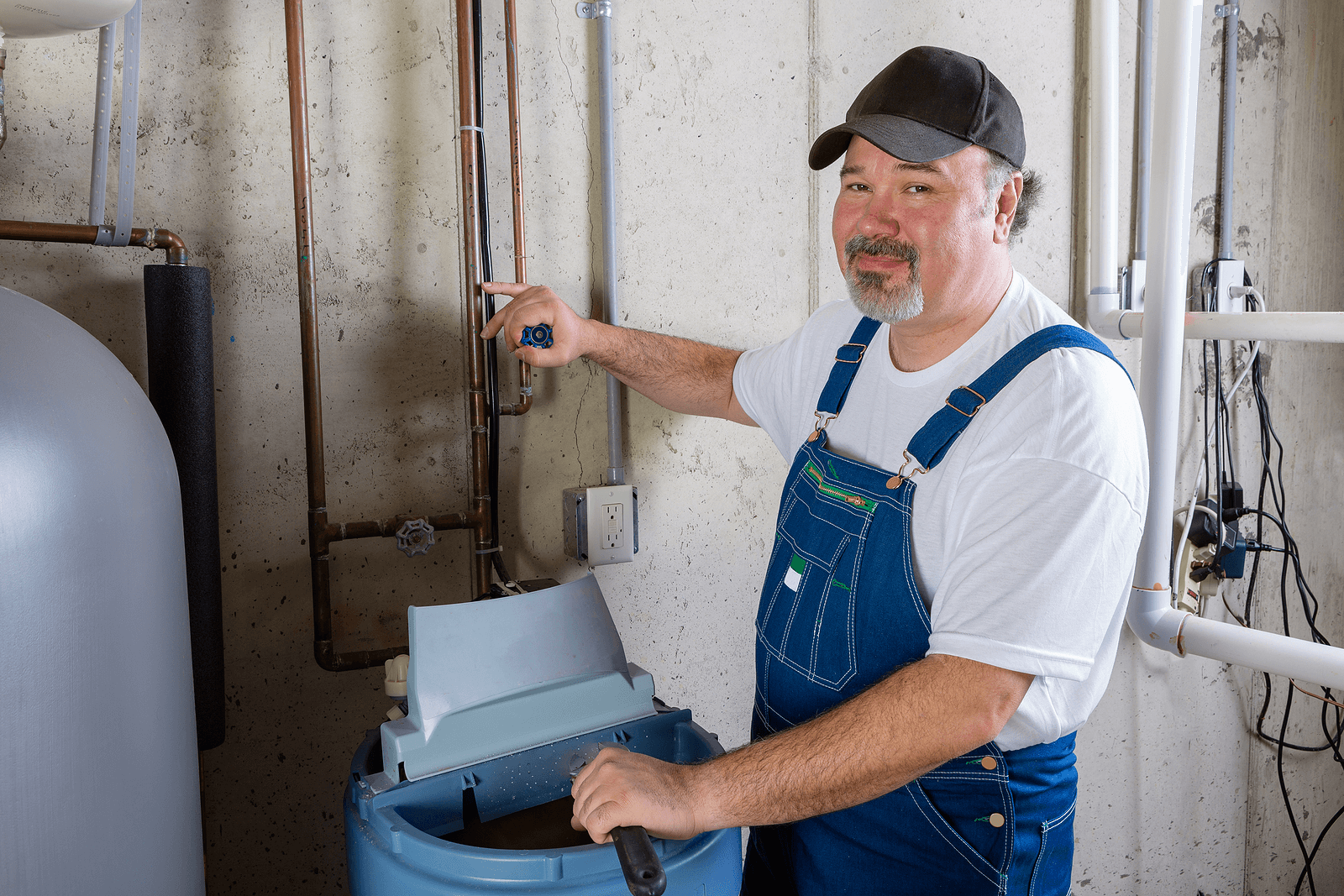
Phoenix is a wonderful place to live and work, but our famous sunshine comes with a hidden cost: very hard water. Municipal sources blend Colorado River water with local groundwater, leaving a mineral soup of calcium and magnesium that averages around 210‑350 parts per million (ppm), or about 13.5 grains per.
Hard water doesn’t usually pose a health risk, yet it wreaks havoc on everything it touches: spots on dishes, dull laundry, itchy skin, and clogged plumbing.
Rayne Water has spent decades helping Phoenix homeowners reclaim the comfort and efficiency of soft water.
This guide shares our perspective on what goes into a water softener installation in Phoenix, how much you should budget, how long it takes, and why partnering with a professional service like ours makes a difference.
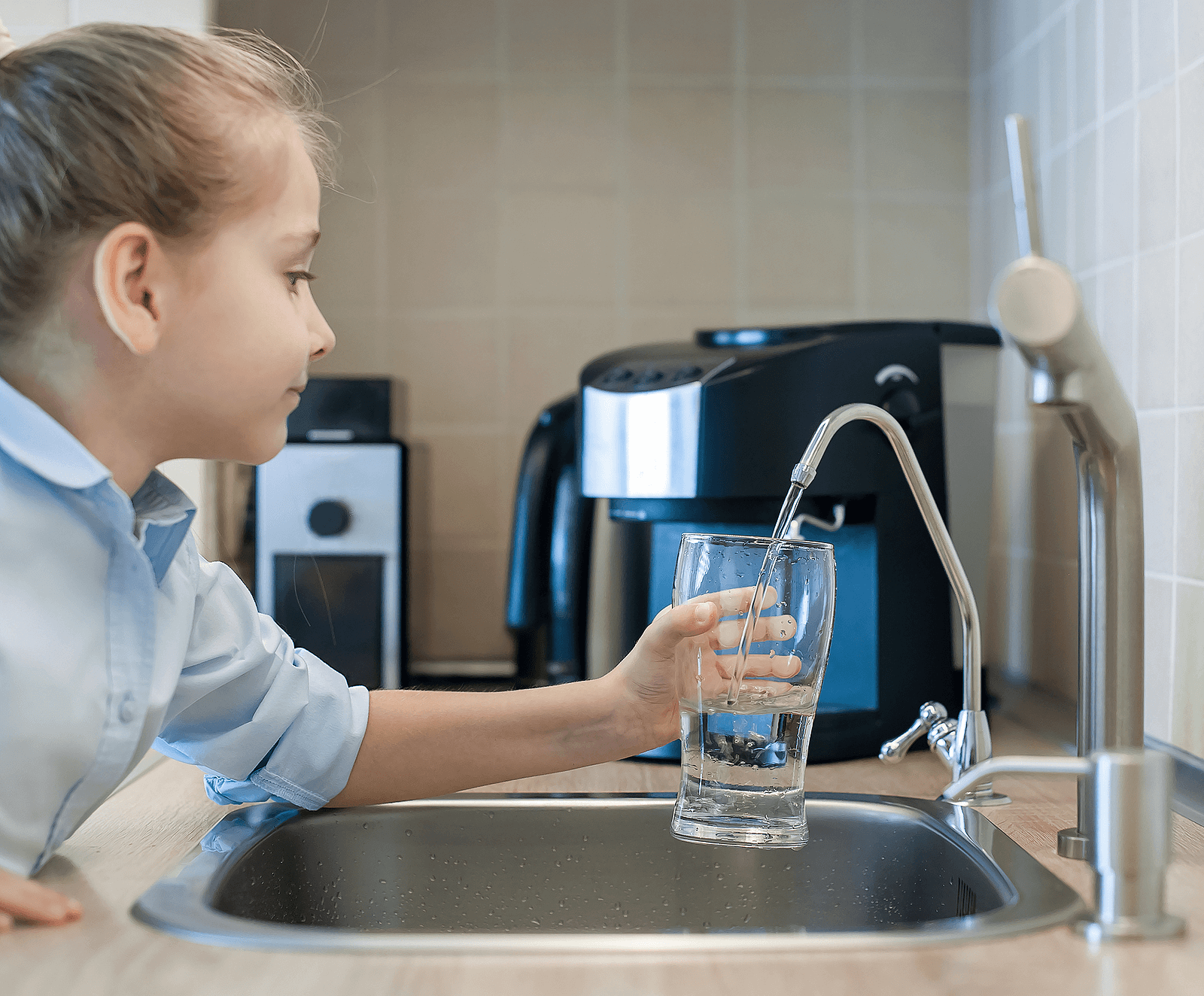
Budgeting for a water softener is easier when you understand the two major cost buckets: equipment and installation.
Total investment typically runs $1,000–$3,000, but that range widens depending on system type, household size, and whether your home is already plumbed for a softener. We’ll break down where those dollars go so there are no surprises.
A water softener’s cost in Phoenix includes equipment, labor, and ongoing care.
Basic salt-based units for small homes run $400–$1,200, while dual-tank or high-efficiency models with smart features range $1,500–$3,500, and large-scale systems can reach $5,000.
Installation is simpler with a pre-plumbed loop at about $200, but full line installs may cost $800–$3,500. Some municipalities require backflow devices or brine-discharge compliance, adding extra fees.
Salt costs about $5–10 per month, while potassium chloride is a pricier eco-friendly option at roughly $35 per bag. Annual maintenance averages $100–$200, and most systems include five- to ten-year warranties with optional extensions for added peace of mind.
The cost of water softener installation in Phoenix depends on several factors. System type plays a big role, with salt-based units delivering true softening, salt-free systems costing less but only conditioning minerals, and dual-tank models priced higher for large households.
Capacity matters too, since Phoenix’s very hard water often requires medium to large systems. Installation location can add complexity if extra plumbing or wiring is needed, while local regulations may require permits or restrict salt discharge.
Finally, professional installation adds labor costs but ensures code compliance, efficiency, and warranty protection, whereas DIY attempts can lead to mistakes that quickly erase any savings.
Purchasing a softener outright isn’t always feasible. Many reputable dealers, including Rayne Water, offer rental and financing programs. Rental plans typically bundle equipment, installation, salt delivery, and maintenance into one monthly payment.
Financing spreads the equipment cost across manageable payments with little or no interest, allowing you to enjoy soft water immediately.
When evaluating these options, ensure the contract details are clear about service responsibilities and that early payoff is permitted without penalties.
Every installation begins with understanding your water and ends with a system that fits seamlessly into your life. Here’s what to expect when you invite Rayne Water into your home.
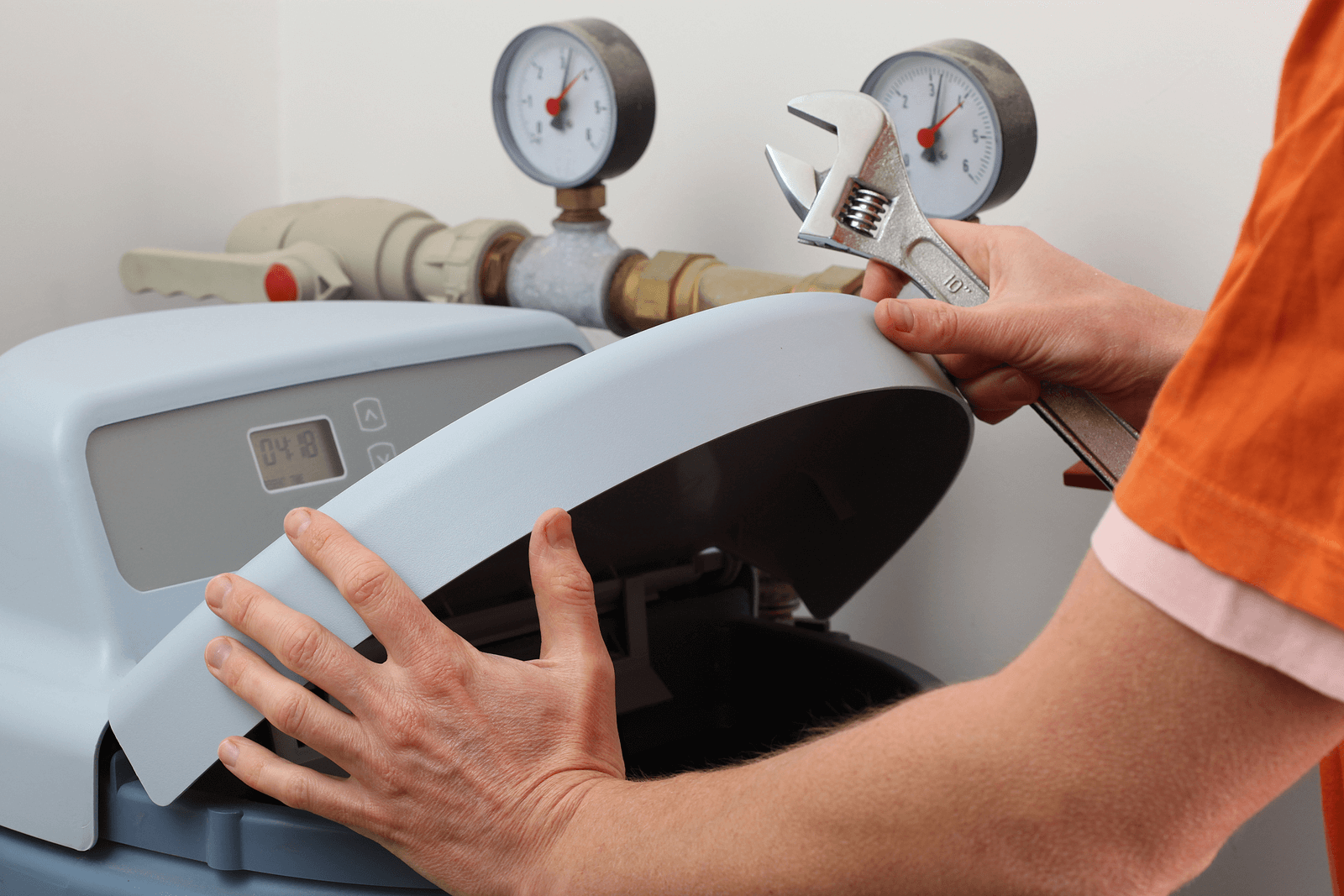
A 2024 water quality report from the city of Phoenix revealed the presence of minerals like calcium and magnesium that contribute to this hardness.
The whole process starts with a complimentary water test performed at your home or via a mailed kit. We measure hardness (in ppm or grains per gallon) and test for contaminants like chlorine, sediment, and heavy metals.
For context, Phoenix tap water typically measures 230 ppm hardness, classifying it as “very hard”. We’ll ask about your household size, water‑usage habits, and specific problems (like dry skin, spotted glassware, or failing water heaters) to tailor our recommendations.
Timeline: Most assessments can be scheduled within 1–3 business days of your inquiry and take about 30 minutes to complete. You can speed things up by having recent water bills and an idea of your daily water usage ready when we arrive.
Armed with test results, we’ll walk you through your options: salt-based softeners for maximum removal, salt-free conditioners to minimize scale buildup, or dual-tank systems for uninterrupted softness, or Soft Water Portable Exchange tanks if you want a no-equipment, low-footprint solution.
We explain the pros and cons of each type, recommended capacities, and any add-ons like pre-filters, whole-house carbon, or reverse-osmosis drinking water. We also confirm if your home has a softener loop and review installation logistics, or, for Portable Exchange tanks, how service swaps work on your street.
Timeline: After choosing your system, we prepare a custom quote. Installations can typically be booked within a week of your consultation, though high‑demand seasons might require a longer lead time.
On installation day, our licensed in-house technicians arrive promptly, protect your home, and review the plan with you. We do not use third-party installers.
While some providers in Phoenix may rely on subcontracted crews, Rayne’s installers are bonded, insured, and part of our team, so you know exactly who is working in your home. We shut off the main water line, prepare the site, cut into the loop or chosen location, and add a bypass valve.
Next, we connect the drain and overflow, install wire controls if necessary, set up the brine tank with a start-up salt dose, and program regeneration.
A test run ensures the system is working properly. Standard installs take 2–4 hours, salt-free systems 1½–3 hours, dual-tank units 3–5 hours, and combo systems 4–6 hours. Your water is only off for 15–30 minutes, and we’ll let you know before it happens.
For Soft Water Portable Exchange customers, there is no cutting into your main line.
We place and connect the exchange tank, verify flow, and document your service schedule for seamless swaps in Phoenix, Scottsdale, Glendale, Sun City, Peoria, Mesa, Goodyear, and Anthem.
After connecting everything, we run your softener through its first regeneration cycle. We measure hardness at the tap before and after to demonstrate the dramatic reduction in minerals.
During this orientation, we teach you how to check salt levels, adjust the regeneration schedule, and bypass the system if needed. We also review signs of trouble (continuous water flow, sudden loss of softness) and provide instructions on reaching Rayne’s 24/7 support.
Most homeowners forget about their softener after installation; that’s okay, because modern systems are largely automated.
During the first month, we recommend checking the brine tank every two weeks to ensure there’s enough salt and verifying that water feels soft (no spots on glassware, soap lathers easily).
We usually schedule a follow‑up to answer questions and adjust settings if needed. Long‑term care involves topping up salt every 4–6 weeks, replacing sediment pre‑filters every 6–12 months, and scheduling annual service to clean the resin bed and check the valves.
With proper care, a quality softener can last 15–20 years.
Installing a water softener in Phoenix benefits from local expertise, including neighborhood hardness patterns, slab foundations, and brine-discharge rules.
Rayne Water manages permits, follows code, and backs every project with liability coverage and strong warranties across Phoenix, Scottsdale, Glendale, Sun City, Peoria, Mesa, Goodyear, and Anthem.
Many providers rely on subcontracted crews. We do not.
Rayne technicians are team members who are factory-trained, bonded, and insured. That means consistent workmanship, clean handoffs to service, and warranty protection that stays intact. It also gives you a single accountable team from consultation to maintenance.
Why professional matters
Rayne is the only company in the Phoenix area that still offers Soft Water Portable Exchange tanks. This option delivers soft water without installing a traditional softener.
It is ideal for rentals, strict HOAs, limited space, or households that want zero maintenance. Our route driver handles the tank exchange on a regular schedule, so there is no salt to buy and no regeneration to program.
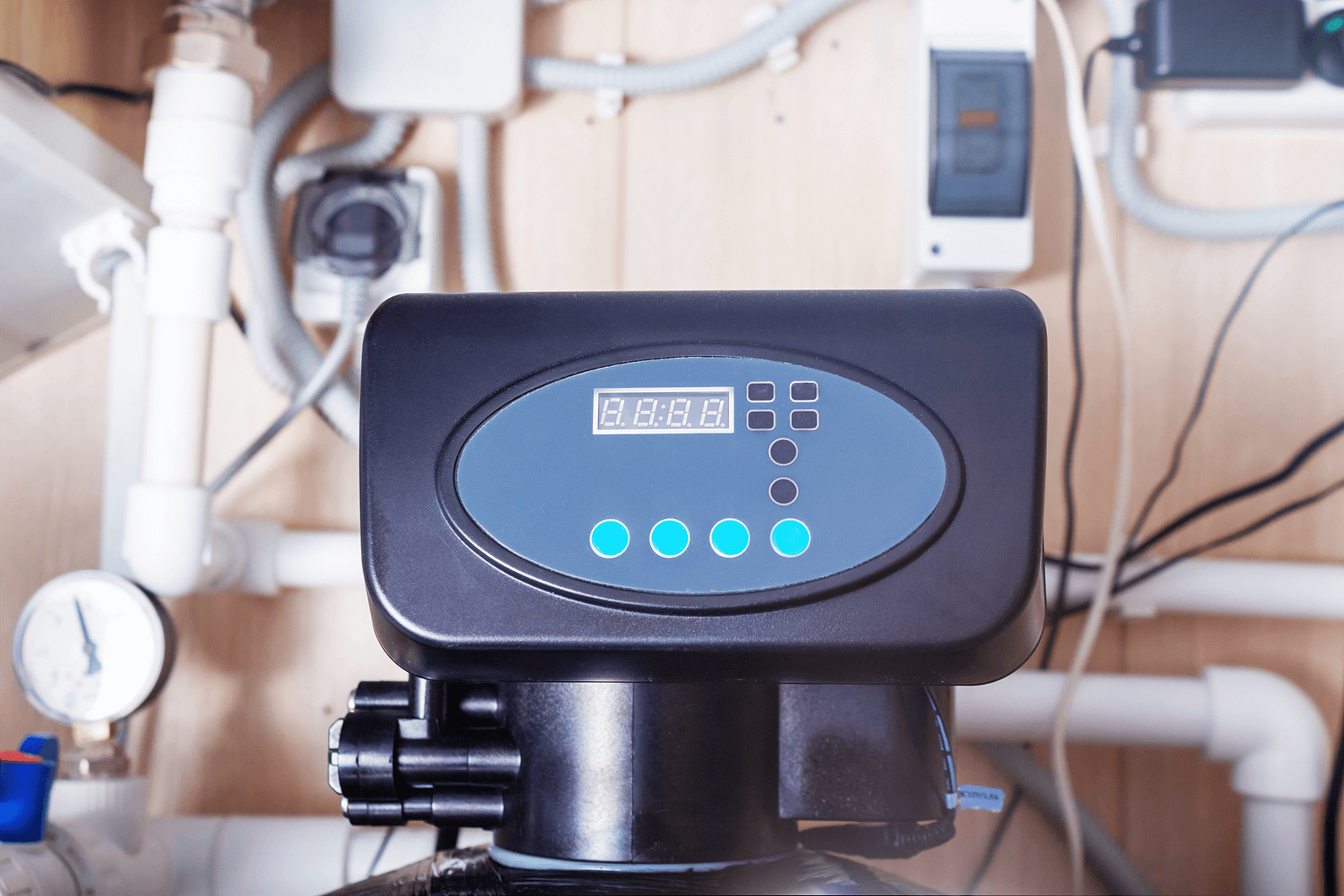
Picking the best water softener and installer may feel overwhelming. Follow these guidelines to make an informed choice:
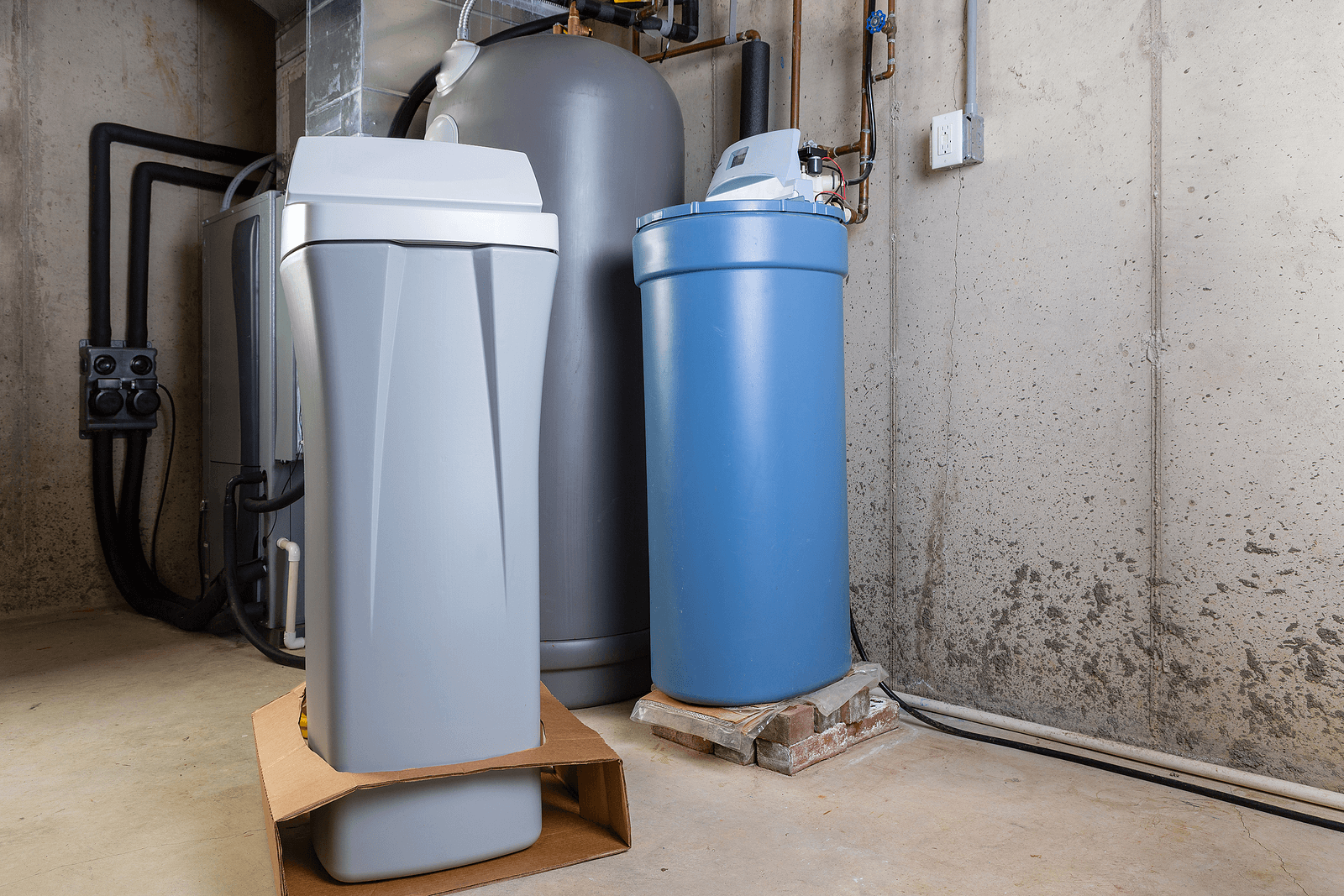
Because Phoenix water averages 230 ppm hardness and can climb higher during summer, the benefits of soft water are dramatic:
Ultimately, soft water improves comfort, protects your investment, and saves money on energy and maintenance. For Phoenix households, it is a practical upgrade rather than a luxury.
Ready to explore options? Start with a free water check and a custom quote.
Rayne Water serves Phoenix, Scottsdale, Glendale, Sun City, Peoria, Mesa, Goodyear, and Anthem with in-house technicians who are factory-trained, bonded, and insured. Prefer a low-impact path? We are the only provider in the Phoenix area with Soft Water Portable Exchange tanks, ideal for rentals, tight spaces, or strict HOAs.
How much does water softener installation cost in Phoenix?
The cost of water softener installation in Phoenix varies widely depending on system type and whether your home has a softener loop. You can expect to spend $1,000–$3,000 for a professionally installed system.
Basic salt-based softeners cost $400–$1,200, with higher-end dual-tank and smart units running $1,500–$3,500. Installation labour for homes with pre‑plumbed loops averages $200, while retrofitting a home without a loop can range $800–$3,500 because new plumbing must be routed.
Don’t forget to factor in recurring salt costs (around $5–10 per month), optional potassium chloride ($35 per 40 lb bag), and periodic maintenance. Renting or financing can spread the expense over time. A professional consultation will yield a precise estimate tailored to your home.
Are there different types of water softeners for Phoenix homes?
The two main categories are salt‑based ion‑exchange softeners and salt‑free conditioners. Salt‑based units use resin beads to exchange hardness minerals (calcium and magnesium) for sodium or potassium. They are the gold standard for Phoenix because our water is extremely hard (around 13.5 grains per gallon).
Salt‑free systems, often called conditioners or descalers, use template‑assisted crystallization to prevent minerals from sticking to surfaces; they reduce scale but do not actually remove hardness.
Dual‑tank softeners provide continuous soft water by alternating regeneration between two tanks.
Some homeowners opt for whole‑house systems that combine softening with carbon filtration or ultraviolet sterilization to address taste, odor, or microbial concerns. An in‑home water test helps determine which type and size best suit your needs and budget.
Can I get Soft Water Portable Exchange tanks in Phoenix?
Yes. Rayne is the only company in the Phoenix area that still offers Soft Water Portable Exchange tanks.
This option delivers soft water without a traditional softener in your home. No electricity, drain line, or salt storage on site.
Our route driver swaps the tank on a set schedule, which makes it ideal for rentals, tight spaces, and strict HOAs across Phoenix, Scottsdale, Glendale, Sun City, Peoria, Mesa, Goodyear, and Anthem.
You get the benefits of soft water with minimal disruption and no maintenance on your side.
Do you use third-party installers or your own technicians?
We rely on our own team. Rayne technicians are factory-trained, bonded, and insured.
Many providers in the area send subcontracted crews, which can create gaps in accountability and warranty support. Using trained staff keeps standards consistent, protects your home, and simplifies service after installation.
You work with the same company for testing, installation, and maintenance.
That clarity matters across Phoenix, Scottsdale, Glendale, Sun City, Peoria, Mesa, Goodyear, and Anthem, where building types and HOA rules vary, and local code experience helps avoid mistakes
Is a permit required for installation in Phoenix?
Most residential water softener installations inside Phoenix city limits do not require a permit. However, some municipalities in Maricopa County have brine‑discharge regulations and require backflow prevention or plumbing inspections.
Additionally, if your installation involves running new electrical circuits or penetrating a structural wall, local building codes may apply. That’s why it’s wise to work with a professional who understands local codes and can obtain any necessary permits.
At Rayne Water, we handle all regulatory paperwork on your behalf.
Before installation, we also verify whether your homeowner’s association has any guidelines on the placement of outdoor equipment, ensuring full compliance.